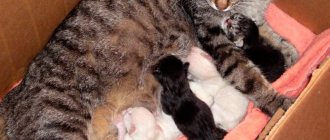Just a stage
Your new kitten is exhibiting completely normal behavior. He grows quickly, eats a lot and has so much energy that he doesn't know what to do with it. When he runs around like crazy, chasing everything, it's completely normal. If you happen to see a weird or unnatural expression on his face, yes, it's crazy, but it's normal for kittens. Each cat is different, but as a rule, hyperactivity decreases markedly after sterilization. Your veterinarian may recommend that your pet be spayed before 6 months of age. You'll also likely notice in the weeks leading up to his first birthday that he'll increasingly gravitate towards you and just want to cuddle.
The most important skills
The main skills of a well-mannered domestic cat are:
- compliance with the daily routine;
- proper nutrition;
- toilet;
- using a scratching post;
- games.
An important aspect of education is communication with a person. The pet must understand that it is the person who is in charge, that is, in the cat’s understanding, the leader of the pack. If the kitten recognizes this, many problems will not even arise.
Daily routine for a kitten
The kitten must live with its owner without causing problems or inconvenience to him. Many people note that at night the cat starts running around the apartment, jumping, creating a lot of noise and preventing them from falling asleep. In this case, you need to play with the kitten thoroughly during the day. The release of excess energy and emotional recharge will help the animal adapt to the human rest regime.
If this behavior starts early in the morning, you should simply ignore your pet. Gradually, the cat will independently wean itself from waking up too early and noisy games at inappropriate times. The ideal schedule for a cat looks like this:
- 08:00 – eat and sleep;
- 09:00 – meal;
- 12:00 – toilet activities;
- 15:00 – food;
- 18:00 – active games;
- 19:10 – food;
- 19:30 – toilet;
- 20:00 – communication with a person;
- 20:30 – eat, lick yourself thoroughly and immediately go to bed.
- 23:00 – sleep.
Of course, all the hours are given very approximately; not a single animal will play or sleep strictly on a schedule. The main thing is to catch the right sequence of activity, rest and feeding. The owner must accustom his pet to a daily routine that will be convenient for both humans and animals.
How to train a kitten to use a litter box
Usually a cat goes to the toilet after eating; this is their physiological feature. In the first weeks, the kitten should be transferred to the tray 10-20 minutes after eating. If he made a mistake, you shouldn’t shout at him or poke your nose into the puddle. Such manipulations have no pedagogical meaning, but can undermine trusting contact with the owner.
The same litter must be used, and there must also be a permanent place for the toilet. Small kittens are placed in the tray 10-20 minutes after eating. If he goes to the toilet successfully, he should be rewarded.
Where to sharpen a kitten's claws
If your pet does not have the skills to use a special scratching post, he needs to be taught to use it. This usually takes about two months. You can lure your cat using mint or lemon balm extract. Cats like the smell of these plants. If you can’t get used to sharpening your claws in one place, you can try trimming your claws.
A place for a kitten to sleep
A cat always chooses a soft, comfortable, safe place to sleep. The bed or house must fully comply with them. Sometimes they choose a more comfortable and secluded place where they can hide from prying eyes. In this case, a house with soft walls and a roof would be an ideal option. Cats often like to sleep at their owner's feet or in their bed.
Chases, ambushes and raids
Chasing and attacking is natural and common to all cats. These rough plays are instinctual. When you see your kitten menacingly attacking a soft toy, or - horror of horrors! - another kitten, then they are not trying to kill each other. Think about your pet's ancestors. These ancient cats had to be tough and fearless to survive. Even though your kitten is domesticated, these ancient instincts are still ingrained in his behavior. If a kitten walks around his mother cat, the cat will first begin to growl, and then, if this does not stop, she will spank him with her paws. Some time before her first birthday, your hyperactive kitten will become a much more mature and noble cat.
Stressful situations for a new family member
Equally important is the kitten’s adaptation to new conditions. Here you need to show tolerance and attention. The pet is separated from his mother, sisters and brothers, he is lonely and scared. Try not to leave the kitten alone in the house for the first two days. So it's better to bring it over the weekend.
Systematic combing will rid your apartment of cat hair, and the animal will be free from clogging of the stomach with hair.
Upon arrival, the baby will get stuck in the carrier and will not come out. Don't rush him: curiosity will prevail, and he will definitely come out of his hiding place. Prepare in advance and purchase bedding, toys, and treats for your baby.
Pet supplies
Taking care of your pet at sptovarov
Buy
Be kind to him, say kind words so that he gets used to your voice.
What not to do:
- Do not allow children to immediately cuddle the furry “acquisition.” This is real stress for him. Over time, he will get used to it and will enjoy playing with children.
- Never yell at a kitten or adult cat. Hitting is strictly prohibited. Cats never forget the slightest humiliation and will definitely take revenge on the offender by going to the toilet in the wrong place. With age, revenge can be more sophisticated - damaged furniture, overturned flower pots and other small dirty tricks. The imagination of cats in this matter is not limited.
- The first mistakes in the “toilet issue” may be associated with fear or with an unusual environment. Initially, cats are very clean animals. Mother cats teach their babies to toilet from a very early age. If the kitten constantly walks past the litter tray, it is your fault: a dirty tray, a poorly chosen place for the toilet.
The first night will be the hardest. The kitten will cry. Out of pity, the owners make an irreparable mistake - they take the crybaby into their bed. It will be almost impossible to evict the kitten from there. If he meows a lot, pick him up and carry him to his bed. Place a bottle of warm water in it, which will remind your baby of his mother’s warm barrel. Over time, kittens get used to sleeping separately.
Build your kitten's upbringing on mutual respect, show attention, care and affection. Cats are very smart, they will definitely reward you with love if you treat them well.
Put some toys
To thrive, your kitten needs physical and mental activity. Buy him some toys. They don't have to be expensive. Provide enough toys that you can rotate every few weeks, which will help your pet combat his energy levels.
Pick up a few toy mice, ping pong balls and a couple of fluffy trinkets. Many kittens also like small balls with bells inside. Play with your kitten for at least half an hour every day. Along with toys, your pet needs attention and love, so it will become a real member of your family.
Kitten in the house: what to prepare before his arrival
When a new tenant arrives, you need to prepare everything necessary for his comfortable stay in your apartment:
- bowls for food and drink;
- tray, tray fillers;
- toys;
- care products and items (scratching post, nail clipper, combing brush).
Breeders recommend purchasing ceramic or metal bowls with a rubberized bottom
Not all bowls are suitable for kittens. Avoid models made of cheap plastic: they are difficult to clean from dirt and grease, and they slide a lot on the surface. Breeders recommend purchasing ceramic or metal bowls with a rubberized bottom. Pay attention to the height of the edges of the bowl and its diameter. The kitten's whiskers and neck should not touch the edges. This not only interferes with normal swallowing, but also causes discomfort and nervous tension in the pet. The cat breed is very clean by nature. If you notice that the animal takes food out of the bowl, but eats with appetite from the floor, then the bowl is simply inconvenient for your pet.
What to look for when buying cat litter? Its sides should not be high so that the baby can climb over them. It is better to stock up on two trays at once until the kitten learns to go to the toilet in a timely manner and in the right place. A good location of the tray is the key to successfully training a kitten to be clean. The cat litter box should be located in a secluded place where there is no noise and convenient enough to approach the litter box.
Kittens are not suitable for kibble litters with large or sharp granules. Clumping clay cat litter is not safe for small pets who try everything. Clay, once in the stomach, can swell and lead to serious problems. The most common and budget-friendly litter used by many cat breeders is wood litter. It comes in two types – for adult cats and small ones.
Once a kitten enters your home, it will determine its own place to sleep. But he will need a bed. You can buy it ready-made at a pet store or make it yourself. Cats are not predictable in their tastes: they may ignore a colorful, expensive cat house in favor of a simple bed made from your old sweater.
The second required item is a scratching post. From the age of one month, the kitten is taught to sharpen its claws in a certain place every morning. A scratching post is a salvation from damage to upholstered furniture by a furry barbarian. It can be made from a piece of carpet or twine. After a couple of months, you can purchase special scratching posts where the cat can lie at different levels.
You may be interested in: Signs of worms in cats
Small tweezers can replace a nail clipper. They are suitable for both kids and adult animals. But be sure to purchase a brush for combing the wool. Systematic combing will rid your apartment of cat hair, and the animal will be free from clogging of the stomach with hair. Long-haired breeds are recommended to be combed daily, others - at least once a week.
Your little newcomer will need toys (mice, feathers, fishing rods, etc.). The desire to hunt and play is an indicator of the pet’s well-being. You need to encourage the kitten to play: this will save him from missing his mother, save him from stress, and save his own apartment from the destruction of a bored little “hunter.” In addition, running after toys is good physical activity for a growing animal.
Useful tips
Your kitten needs discipline and guidance, just like all small children. When he does something wrong, like attacking your leg, biting or scratching you, just discipline him. This may seem difficult, especially if you have a sharp claw or tooth embedded in your leg, but grit your teeth and remember to exercise self-control. Growing kittens respond best to calm and consistent discipline. Immediately after he does something, say “no” and calmly take him to a room where he will be on his own for 5 to 10 minutes. Do this immediately, or he will simply become confused and not understand anything.
Why is the kitten aggressive?
There are many reasons for aggression in kittens, just like in human children. And four-legged warriors express it in the only available way: by biting and scratching.
Causes of aggression
If a kitten has crossed the threshold of an unfamiliar house for the first time, you should not immediately squeeze it in. Give your baby time to look around and get used to the new environment. Soon he himself will come to rub against your leg.
Kittens react very violently to their potential prey: birds, fish or rodents. You should not keep them in the same room as a small predator, otherwise you risk one day seeing the cage open, and instead of your favorite canary there are only a few yellow feathers. But even if you are absolutely sure of the strength of the cage, such a proximity is undesirable. “Game” will constantly experience stress, which will significantly shorten its already short life.
A kitten living in an apartment needs to be given an outlet for energy. He must rush around the room, jump on cabinets, swing on curtains, otherwise your hands will suffer. Of course, no one wants to turn their apartment into a gym for a little prankster. But there is also a way out of this situation. Buy a scratching post for your pet, or even better, a gaming set, and let him train until he drops. If he has a convenient observation post right under the ceiling and a secluded place under the bed for a sound afternoon nap, he will be simply happy.
Sometimes kittens react aggressively to unfamiliar smells, and people often do not notice them at all.
And, of course, the kitten will behave aggressively if the touch of someone else’s hand is unpleasant to him or something hurts him. In the first case, warn the guest in advance not to try to pet the kitten (when getting to know the dog, they show much more respect), and in the second, try to show the baby to the veterinarian as soon as possible.
In a dream
The kitten sleeps peacefully on a pillow, purring quietly. Little by little the cooing sounds fade away and the baby falls into a deep sleep. Suddenly his paws, whiskers and tail begin to twitch slightly, and his teeth make a characteristic tapping sound... The kitten dreams of a chase.
There are few owners who have not encountered this phenomenon. Most often, if you gently stroke the baby at this moment, he will open his eyes slightly, purr with relief and fall back into sleep. But there are such temperamental natures who, without opening their eyes, will grab your hand with a death grip. And others can even rush to the owner and bite him - and all this without waking up. Even an adult can suffer significantly from such an unconscious attack. What can we say about small children! Very often, traces of cat aggression remain on the victim’s body for many years, or even a lifetime.
This is why you should not allow your pet to sleep in the owner's bed. Ideally, the kitten should spend the night in a separate room from the first day in the house.
If your pet exhibits this behavior, it is advisable to take him to the vet. Perhaps there are serious reasons for aggression in a dream: acute pain, mental disorders, increased hyperfunction of the thyroid gland. In any case, the kitten will need the help of a specialist.
How to raise a kitten to be affectionate and tame
Owners often wonder how to raise an affectionate cat.
When a kitten has just arrived in its new home, it does not yet understand how it should behave. He needs an adaptation period. You should not leave a small kitten alone for a long period. You need to play with him often, talk affectionately, since these animals very well understand a person’s intonations and his mood at the moment. If the owner wants to see an affectionate and kind animal in front of him, there must be trust. The owner must observe the established daily routine and adhere to it strictly. The kitten should have a lot of toys - soft balls, mice, strings and other objects. Kids play a lot and spend their time very actively, it is advisable that this happens together with a person. Don’t forget about moments of affectionate communication - despite their apparent independence, cats love to purr to their person and cuddle in his arms.
This will create trusting contact between the animal and the owner. How to properly raise a kitten determines its character and behavior in the future, when it becomes a mature animal.
Diseases that cause frequent sneezing
If attacks become more frequent and accompanying symptoms appear, it is more reliable to get diagnosed. After an examination, the veterinarian will determine why the kitten is sneezing and what to do to normalize its condition.
Viruses and bacteria
With an infectious disease, in addition to sneezing, other alarming symptoms appear. The baby's nose becomes hot and dry. Fever, runny nose and cough appear. Tearfulness increases, and discharge from the eyes and nose may contain impurities of pus or blood. The small pet loses activity and refuses to eat. Possible intestinal upset and vomiting.
Most often, kittens are diagnosed with calcivirosis, rhinotracheitis, chlamydia and bordetellosis. All these pathologies affect the upper respiratory tract and can provoke the development of pneumonia. Their occurrence can be prevented through vaccinations and following preventive recommendations.
Allergy
Frequent sneezing, sniffles, red eyes and itching are the main symptoms of allergies. Allergens include pollen, decorative cosmetics, household chemicals, tobacco, house dust, litter, food and many other irritants. It is very difficult to recognize the cause of allergies on your own, so you cannot do without the help of a veterinarian.
Lack of timely assistance is fraught with exacerbation of attacks and the appearance of bronchial asthma. In severe cases of this pathology, the animal may die from suffocation.
Parasitosis
Irritation of the upper respiratory tract is caused by lung and heartworms, which pose a mortal danger to the infected person. In addition to increased tearing, breathing problems and a runny nose, parasitosis causes diarrhea and nausea. The waste products of helminths poison and weaken the body. Your pet may suddenly lose weight even if it maintains its appetite.
Nasal polyps
Polyps are growths that arise due to deformation of the mucous membrane. They can move around the nasal cavity and are usually not accompanied by pain. Due to the blockage of air passages, the animal begins to suffer from a lack of oxygen. This is accompanied by wheezing, snoring and copious discharge of clear fluid.
Foreign body
Smell is one of the ways to understand the world. A small pet becoming familiar with a new object may accidentally inhale it. If the object that gets inside turns out to be too large, it will be impossible to remove it on your own. The baby will sneeze and scratch his nose. If the mucous membrane is damaged, the resulting discharge may turn scarlet.
Cold
The symptoms of a cold and an infection are similar. The only difference is that in the first case the animal gets sick due to hypothermia. The immune system fails when exposed to a draft for a long time, walking in inclement weather, wool that is not sufficiently dried after bathing, frequent use of air conditioning, and other situations that disrupt natural heat exchange. A weakened body is more vulnerable to viruses and bacteria, so a secondary infection may occur against the background of a cold.
Oral problems
Dental diseases can be recognized not only by sore gums and sore teeth, but also by sneezing. Usually the reflex is awakened by inflammation and is accompanied by increased salivation and snoring.
Oncology
Nasal cavity cancer is a rare disease typical of older animals and representatives of the European Shorthair breed. Usually, owners notice it at a late stage, when the pet develops mucous discharge with blood and begins to have convulsions. It is almost impossible to save the animal by this time. To avoid a fatal outcome, veterinarians recommend checking a kitten at risk immediately after the appearance of frequent sneezing, loud snoring and heavy discharge.











